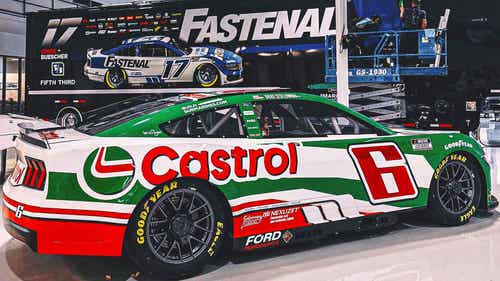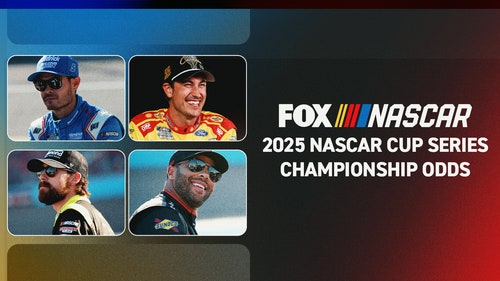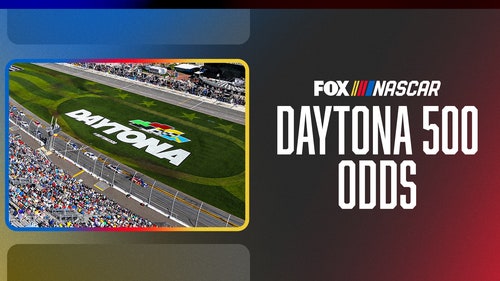
Bubba Wallace, NASCAR promote diversity and inclusivity in Chicago
CHICAGO — NASCAR brings its cars to the streets of Chicago this weekend, with the skyscrapers in the background and the iconic Buckingham Fountain in view of the start-finish line.
The idea is to bring the sport to people who haven't experienced it before, part of a festival with three major musical acts over a two-day span, as well as possibly integrating NASCAR into the Chicago culture for at least a weekend.
But to do that, NASCAR couldn't just put up barriers and fencing, close streets (to the frustration of locals) and wave the green flag. The race not only is disrupting the lives of some Chicagoans, but it also brings with it — just as it does anywhere new NASCAR races — concerns over noise and environmental impact.
So NASCAR had to find ways to integrate itself with the city, and not just in the touristy Grant Park. It went to South Side Chicago with Bubba Wallace, its lone full-time Black driver in the Cup Series, with well-known Chicago rapper Lupe Fiasco performing Wednesday night for a free "Bubba's Block Party" attended by about 4,000 people.
[Related: Inaugural Chicago street-course race latest bold move by NASCAR]
On Thursday, the Tate brothers — led by Larenz Tate, who rose to fame in the 1993 movie "Menace II Society" — made an appearance at a park located just a couple of blocks from their West Side Chicago childhood home. They were joined by newly elected Chicago mayor Brandon Johnson and a few hundred kids as part of a NASCAR program that provides grants to city parks department initiatives.
"There are three components that I'm really looking forward to," Johnson said during his remarks at the event with the Tate brothers. "One, NASCAR recognizing that the city of Chicago is made up of neighborhoods. That is what is unique about the city of Chicago — our neighborhoods tell the story of who we are as a city.
"The second thing is exposing our young people to the full industry of NASCAR. And third the economic benefit. ... I know NASCAR is making sure that there are economic opportunities that are not just in place for this weekend."
At the event, NASCAR gave out ticket vouchers for the racing-music festival, for which general admission for the weekend costs $269. NASCAR doesn't know how many people will claim the vouchers and knows that giving away tickets for such a pricey event won't sit well with fans who say they were priced out of coming.
What NASCAR also knows is that if it wants to diversify its fan base and put money behind its words of this being an event to expand the sport, it needs to expose racing to people who have not seen it before or wouldn't naturally go to a race.
NASCAR has conducted various outreach events in other cities, including another Bubba Block Party in Richmond, but few tracks feature a race where public transportation makes it more feasible for people to attend.
"Introducing our sport to a new audience is why we are here," said Julie Giese, president of the Chicago street race.
"We made a commitment on Day 1 with the city of Chicago that we were going to invest in the community, be here year-round, build programs to support the community and understand all the different opportunities and ways to be part of NASCAR."
NASCAR in Chicago
Leading the way is Wallace, who in 2020 advocated for NASCAR to ban the Confederate flag at events after hearing too many times from those who said it made them feel uncomfortable to attend a race. NASCAR made the decision to ban the flag and Wallace, who also drove a "Black Lives Matter" car, saw his notoriety surge into mainstream U.S. culture while also making him one of the most polarizing drivers on the circuit.
The 29-year-old driver now hopes that events such as "Bubba's Block Party" will have an impact.
"We want to change for the better and allow all ages and races ... to be a part of our sport with no boundaries, no hindrance there," Wallace told reporters on Wednesday. "That's showing that we care and that we're inclusive.
"Are we going to get every avenue right? No. But it's a non-stop process."
The impact might not be seen immediately. The kids running around with paper Bubba Wallace helmets at his block party might not go to the race this weekend, but NASCAR can hope that at some point in the next decade, those kids might watch a little more NASCAR and perhaps attend a race.
"Both of [these events] embody what the race is sort of dreamed up to be in terms of giving us an opportunity to branch out and reach new audiences," said NASCAR Vice President of Diversity and Inclusion Brandon Thompson.
"But more important is to show up in the community and to be a part and an active participant in the community. ... As we ramp up to the race, it's really unique for us as NASCAR to be able to do these type of things."
Mayor looking forward to Grant Park race
NASCAR also hopes the exposure can increase diversity in its teams. This year the organization started funding various STEM (science, technology, engineering and math) programs that are vital to educating the next wave of people who will work in race shops to make cars go fast.
"A lot of these things take time — there are journeys with this," Thompson said. "Having Bubba be able to show up, having the Tate brothers show up and having a partnership with them this weekend in the city of Chicago, I think is huge in terms of raising awareness in social, digital and TV."
When asked during his media session what more NASCAR needs to do, Wallace responded that he needs to hear from those who might not feel as welcome.
"That's a question for me to ask you," he said. "I can kind of be the leading voice for that change. ... I want people to just continue to show up and have a good time. It's more on you guys giving constructive feedback and I can lay a fist down."
Wallace certainly hears from those who feel that NASCAR has gone too far in some of the steps it has taken to broaden its fan base.
"There are three types of people: ones that will accept change, the ones that are on the fence about change and the ones that will never change," Wallace said.
"You can never get through the minds of the people that will never change. So we don't really focus our energy on those people. ... Unfortunately, a lot of people don't like the change that we're doing as a sport to tap into different demographics and make the sport more welcome and inclusive. That's on them. They'll have to live with that. For us, we continue to march forward."
Bob Pockrass covers NASCAR for FOX Sports. He has spent decades covering motorsports, including the past 30 Daytona 500s, with stints at ESPN, Sporting News, NASCAR Scene magazine and The (Daytona Beach) News-Journal. Follow him on Twitter @bobpockrass, and sign up for the FOX Sports NASCAR Newsletter with Bob Pockrass.
Top NASCAR stories from FOX Sports:
- NASCAR midseason awards: Best driver, top rookie, biggest upset and more
- NASCAR Power Rankings: Ross Chastain on the rise following Nashville win
- Inaugural Chicago street-course race latest bold move by NASCAR
- NASCAR's 75 greatest drivers: Dale Jr., Tony Stewart, Chase Elliott among additions
- NASCAR Cup Series: Full 2023 schedule, dates, race results












